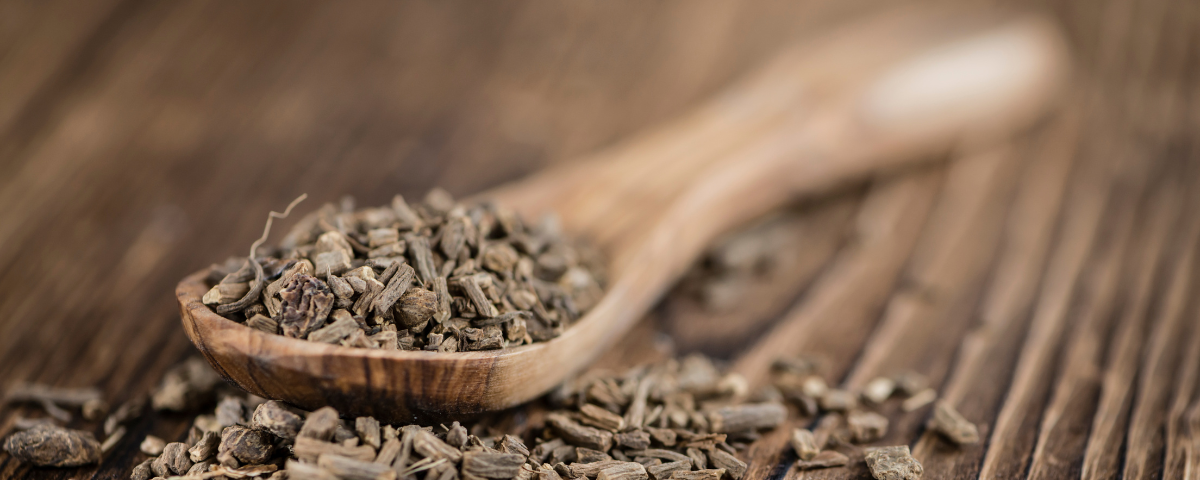While there are various approaches to managing stress issues, one natural remedy that has gained significant attention is valerian root. People have used it for centuries as a herbal supplement to promote relaxation. This comprehensive blog post will delve into the use of the valerian root for anxiety.
So, let’s explore the world of valerian root and discover its potential to bring calm and tranquility into your life.
What is Valerian Root?
Valerian root is a herbal remedy derived from the Valeriana officinalis plant, which has been used for centuries as a natural treatment for various ailments, including sleep problems, anxiety, and stress. It is known for its soothing properties and is often used as a sleep aid.
Valerian root contains various compounds, including valerenic acid and volatile oils, which are believed to contribute to its therapeutic effects. It is available in multiple forms, including capsules, tablets, liquid extracts, and teas.
Valerian Root Benefits
Valerian root offers a range of potential benefits for individuals with anxiety disorders, stress, and sleep issues. Let’s delve deeper into some of its key benefits:
- Valerian root has a sedating effect.
It calms the nervous system, which people commonly use for treating anxiety and stress.
Valerian root compounds interact with brain receptors, increasing GABA and promoting a calming effect.
But it’s imperative to note that there isn’t much scientific background for the use of Valerian as a remedy for anxiety or stress.
In general, valerian root’s calming properties can help reduce feelings of restlessness and promote overall well-being.
*Gamma-aminobutyric acid (GABA) is a naturally occurring brain neurotransmitter regulating neuronal activity. It acts as an inhibitory neurotransmitter, meaning it helps to calm and quiet the activity of nerve cells
- Improved Sleep Quality
Many Americans struggle with sleep issues, such as difficulty falling asleep or staying asleep throughout the night.
Valerian root for sleep is a popular choice among those seeking natural aids.
It is known to promote relaxation and improve the quality of sleep, allowing individuals to experience a more restful slumber.
By increasing GABA levels in the brain, the valerian root may help regulate sleep patterns and improve sleep quality. It can help reduce nighttime awakenings, allowing you to experience a deeper and more rejuvenating sleep.
Waking up refreshed and energized can significantly impact your overall well-being and ability to handle daily challenges.
Valerian Root Tea
Valerian root tea is a popular and convenient way to incorporate this herbal remedy into your daily routine.
Drinking valerian root tea before bedtime can have a particularly beneficial effect on sleep quality.
Drinking valerian root tea before bed can reduce anxiety and create a calming effect. This can make it a soothing and pleasant nightly routine.
Is Valerian Root safe?
While valerian root is generally considered safe for most individuals, it’s essential to be aware of potential side effects.
Common Valerian root side effects may include:
- mild gastrointestinal discomfort
- dizziness
- daytime drowsiness
- sedation
It’s crucial to follow recommended dosages and guidelines when using valerian root.
If you experience any unusual or severe side effects, it’s recommended to discontinue use and consult with a healthcare professional.
How to Take Valerian Root
When taking valerian root, following proper guidelines to ensure optimal effectiveness is essential.
How Much Valerian to Take
Determining the appropriate valerian root dosage can vary based on factors such as age, weight, and individual tolerance.
But the dose of Valerian recommended is usually 2 to 3 doses of 300mg daily.
When to Take Valerian Root
Determining the ideal time to take valerian root is an important consideration to optimize its effects on sleep and relaxation.
While there is no strict rule, taking valerian root in the evening is generally recommended. Preferably 30 minutes to an hour before bedtime.
Taking valerian root in the evening allows its soothing properties to take effect as you wind down for the night.
Adding it to your bedtime routine lets you enjoy its calming effects, which may improve your sleep quality.
Valerian Supplements
Valerian root is widely available in supplement form, including capsules and extracts. Choosing high-quality, standardized supplements from reputable brands is crucial to ensure purity and potency. Always read product labels and follow the recommended dosage instructions.
Valerian root supplements provide a convenient and precise way to incorporate Valerian into your daily routine. They offer a concentrated form of valerian root extract, making it easier to achieve the desired effects.
Valerian Root Alternatives
While valerian root is a popular herbal remedy for anxiety, stress, and sleep, it may not suit everyone. If you’re looking for alternatives to valerian root, there are several other natural remedies that you can consider:
- Chamomile: People often use chamomile, a well-known herb, for its calming and relaxing properties. Chamomile tea is a popular way to consume this herb.
- Lavender: Lavender is known for its soothing aroma and can help promote relaxation and reduce stress. It can be used as essential oil, added to a bath, or diffused in the bedroom.
- Passionflower: Passionflower is another herb with calming properties that can help reduce anxiety and improve sleep. It is available in various forms, including tea, capsules, and tinctures.
- Lemon balm: A mint family member is used to reduce anxiety and promote relaxation. It is often consumed as a tea or taken in supplement form.
Everyone’s body is unique, and what works for one person may not work for another.
Conclusion:
Valerian root is a natural remedy for anxiety, stress, and sleep problems, offering an alternative to drugs.
Before incorporating valerian root into your daily routine, it is crucial to consult with a healthcare professional. This is especially important if you have any pre-existing medical conditions or are taking other medications.
Remember, prioritizing your well-being includes seeking natural remedies and holistic approaches to support your mental and physical health.
Disclaimer: The information provided in this article is for informational purposes only and is not intended to substitute for professional medical advice, diagnosis, or treatment.



